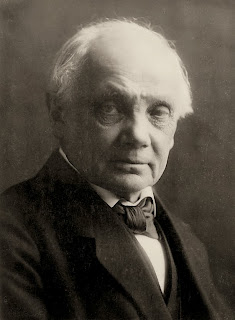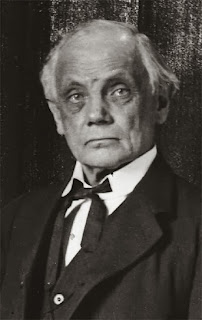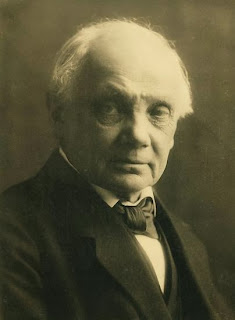Harald Høffding (1843 - 1931) onder meer Spinozakenner en curator van de Societas Spinozana
 Hoe meer ik van deze filosoof,
nadat ik zijn naam was tegengekomen en verder zocht, onder ogen
kreeg, des te groter werd mijn bewondering hoe hij vanuit grote
kennis van de geschiedenis van de filosofie zich serieus met Spinoza
bezig hield. Maar wie zal in kringen van Spinoza-liefhebbers nog van
hem hebben gehoord?
Hoe meer ik van deze filosoof,
nadat ik zijn naam was tegengekomen en verder zocht, onder ogen
kreeg, des te groter werd mijn bewondering hoe hij vanuit grote
kennis van de geschiedenis van de filosofie zich serieus met Spinoza
bezig hield. Maar wie zal in kringen van Spinoza-liefhebbers nog van
hem hebben gehoord?
Zijn Ethica- analyse verscheen als deel IV in de Bibliotheca Spinozana. Een artikel van hem in Chronicon Spinozanum vind ik nog zo waardevol dat ik het vandaag als PDF op internet heb geplaatst.
Deze Deense filosoof, derde zoon in een welvarend koopmansgezin, studeerde eerst theologie, tijdens welke studie hij in een religieuze crisis kwam. Lezing van het werk van Søren Kierkegaard deed hem betwijfelen dat hij een goed christen zou kunnen zijn en hij besloot na z'n diploma in 1865 om geen priester te worden. Hij ging over naar filosofie, studeerde in 1868-1869 ook in Parijs waar hij kennis maakte met het Franse en Engelse positivisme. Na zijn terugkeer in Kopenhagen studeerde hij af op de filosofie van G.W.F. Hegel (1872) en aansluitend op de hedendaagse Britse filosofie (1874). Hij werd eerst als leraar werkzaam voor hij in 1883 hoogleraar werd aan de Universiteit van Kopenhagen, wat hij bleef tot 1915. Hij was mentor en docent filosofie van Niels Bohr [Cf.]
Hij schreef over ethiek, religie, psychologie, filosofiegeschiedenis, over concepten van totaliteit (1917), relationaliteit (1921). Ook een biografie over Søren Kierkegaard. Bijna al z'n werk is in het Duits vertaald. Bekend van hem is Den store Humor: en psychologisk Studie [Humor als Lebensgefühl], maar het meest bekend is hij om zijn monumentale Den nyere Filosofis Historie (1894-95); in het Duits vertaald, Geschichte der Philosophie en in het Engels, A Brief History of Modern Philosophy (1912), te vinden op wikisource. Enigszins onder invloed van Hegels historisch-filosofische methode trachtte hij filosofen van diverse tijdperken te vergelijken met elkaar en met wetenschappers en ze als ontwikkelingsstadia in een enkel gedachtesysteem onder te brengen. In het tweede boek behandelde hij "The great systems", t.w. Descartes, Hobbes, Spinoza en Leibniz. [Ook op books.google]. Met waardering constateer ik dat hij 'parallelism, or the identity hypothesis' als typering van Spinoza's leer niet zulke gelukkige uitdrukkingen vindt.
Systeemgedachte
Hij
werkte veelvuldig met het concept 'systeem'. Daarover schrijft hij:
"A system is not so important as a method. A system is of
significance because it brings order and clearness into our
knowledge, but he who hopes by its help to reach something more, he
who thinks to extend his knowledge by means of a system is
self-deceived." [Cf.]
Behalve voor zijn filosofiegeschiedenis hield hij zich ook via monografieën en artikelen met Spinoza bezig. Zo schreef hij:
• Spinoza's Lìv og Löre (Spinoza's Leven en Leer), Kopenhagen, 1877.
• Ook in Outlines of Psychology (1881) is veel over Spinoza te vinden [Cf. archive.org]
• Spinoza's Ethica. Analyse og Karakteristik (1918). Dr. Willem Meijer gaf in het eerste nummer van Chronicon Spinozanum een lange [p. 303-314] en enthousiaste bespreking, roemde "de edele onpartijdigheid" en achtte het boek "een der belangrijkste, die in de laatste halve eeuw, waarin zooveel merkwaardigs over de Ethica is geschreven, zijn uitgekomen." Het werd vertaald in het Duits en in 1924 als vierde deel, Spinozas Ethica. Analyse und Charakteristik, opgenomen in de namens de Societas Spinozana bij C. Winter in Heidelberg uitgegeven Bibliotheca Spinozana.
 Hij werd, mede vanwege deze
publicaties, gevraagd en werd curator van de in 1920 opgerichte
Societas Spinozana, waarvan de andere waren W. Meijer (den Haag), Sir
Frederick Pollock (Londen), Léon Brunschvicg (Parijs), J.H. Carp
(Den Haag) en Carl Gebhardt (Frankfurt a.M.).
Hij werd, mede vanwege deze
publicaties, gevraagd en werd curator van de in 1920 opgerichte
Societas Spinozana, waarvan de andere waren W. Meijer (den Haag), Sir
Frederick Pollock (Londen), Léon Brunschvicg (Parijs), J.H. Carp
(Den Haag) en Carl Gebhardt (Frankfurt a.M.).
• Høffding's "Die Drei Gedankenmotive Spinozas" verscheen in het eerste nummer (1921) van Chronicon Spinozanum. Ook in dit artikel behandelde (en bekritiseerde) hij Spinoza's leer vanuit de systeemgedachte. Hij tracht er de voor de 'Aufbau des Systemes entscheidenden Voraussetzungen' in op te sporen. Hij probeert dus na te gaan hoe Spinoza tot een aantal hoofdgedachten in zijn filosofie is gekomen. Hij ontwaart drie beginselen: de joodse theologie, waarin hij is opgevoed (God), de wetenschappelijk wereldbeschouwing van zijn dagen (Natuur), en de toenmalige scholastiek (Substantie). In dat artikel maakt hij m.i. goed duidelijk dat Spinoza's gebruik van de termen God en Substantie, naast Natuur, bepaald geen 'accommodatie' is. Ik beveel belangstellenden dit artikel aan en nam de moeite er daartoe een PDF van te maken en op internet te publiceren. [Cf. PDF]
Tenslotte kwam ik nog tegen:
• "Die Verflechtung der Probleme in Spinozas Philosophie." In: Kant-Studien. Volume 32 (1941), Issue 1-3, Pages 29–43
Ik citeer hier de eerste alinea's over Spinoza in zijn Geschiedenis van de moderne filosofie:
Baruch Spinoza’s (1632-1677) chief work (Ethica ordine geometrico demonstrate, 1677) represents the most profound effort of this period to elaborate the fundamental principles of the new conception of nature into a general world theory. This work, despite its abstract form, is by no means impersonal and purely theoretical. With Spinoza, thought and life are identical. Clear thinking was for him the way to spiritual freedom, the highest form of personal life. He aims to regard all the various aspects and forms of existence from the viewpoint of internal harmony. The majesty of his thought consists, first of all, in the resolute consistency with which he elaborates the various intellectual processes, each of which, in itself, expresses an essential characteristic of reality; every essential viewpoint must receive due recognition, without prejudice and without compromise; and, secondly, in the proof that every system of thought which is inherently self-consistent and complete nevertheless signifies nothing more than a single aspect or form of infinite Being. In this way he seeks to maintain unity and multiplicity, mind and matter, eternity and time, value and reality in their inner identity. Each of these fundamental concepts is in itself an expression of the total reality and can therefore be carried out absolutely.
In his chief work, mentioned above, he elaborates this theory deductively or synthetically. Beginning with definitions and axioms we advance through a series of doctrinal propositions. Owing to this method of treatment Spinoza failed to give his own ideas their true force. Their content is not adapted to this mode of treatment, and his proofs are therefore frequently untenable. Nor does the method pursued in his treatment correspond with the method by which he discovered his theory. The unfinished treatise De emendatione intellectus is the chief source of information concerning this method. Here he begins autobiographically after the manner of Descartes in his Discours. Experience has taught him that neither enjoyment, nor wealth, nor honor can be the highest good. He finds it, on the contrary, in the knowledge of the relation existing between our mind and nature as a whole. The pleasures of knowledge became his highest and strongest ambition, his ruling passion, and the glory conferred on existence through the possibility of participating in this joy is what made life worth living to him. It is for this very reason however that he institutes the inquiry as to the possibility of realizing this end, and he then indicates how he arrived at the definitions and axioms with which the “Ethics” begins.

Harald Høffding kreeg een centrale plaats in de Deense wetenschap en cultuur (hij werd in 1884 lid van de Koninklijke Deense Academie van Wetenschappen) en ook veel erkenning buiten Denemarken, wellicht meer als gevolg van zijn uitgebreide kennis, eerlijkheid en voorzichtigheid dan door grote originaliteit - volgens deze Deense Encyclopedie.
Mij lijkt zijn filosofie met accent op Spinoza een monografie waard.
Harald Høffding op de Deense wiki en de Engelse wiki; veel van zijn werk op archive.org

